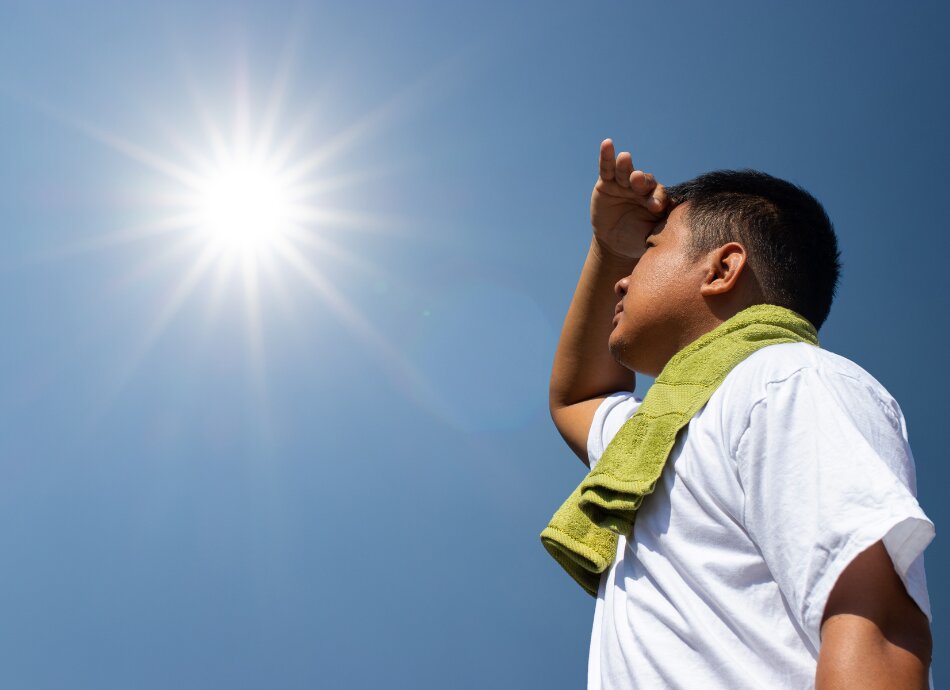Wishing everyone a safe and happy Christmas and New Year – Meri Kirihimete from the Healthify team.
Heat stroke and heat exhaustion
Key points about heat stroke and heat exhaustion
- When you are exposed to too much heat, your body has protective mechanisms that help to keep your temperature normal. When this happens you will feel the symptoms of heat exhaustion.
- If you stay in the sun for longer, your body struggles to cope with the extra heat. Once your temperature rises to 40°C, you will have heat stroke.
- Heat stroke is an emergency and needs to be treated immediately.
- There are things you can do to help prevent heat stroke and heat exhaustion, including drinking plenty of water, especially during hot weather or when exercising.

If you're exposed to too much heat, your body has protective mechanisms that help to keep your temperature normal. When this happens you'll feel the symptoms of heat exhaustion, which are your body's way of telling you to get out of the heat.
If you stay in the sun for longer, your body struggles to cope with the extra heat. Once your temperature rises to 40°C, you'll have heat stroke. This is an emergency and needs to be treated immediately.
If you or someone you care for has any of the following symptoms, call 111 for an ambulance or go to the nearest emergency department immediately: |
|
When you are exposed to too much heat, your body has protective mechanisms that help to keep your body temperature normal. This is important as a lot of internal processes in your body require normal body temperature to work well.
If you get too hot, you'll experience symptoms (as listed below) as your body's protective mechanisms start to respond. Your body will react by:
- sweating to lose more heat
- making your urine (pee) darker and more concentrated (your body is trying to preserve more water)
- making you feel thirsty.
Your body is trying to tell you to get out of the sun or extreme heat. This is called heat exhaustion.
If you stay in the sun for longer, your body will struggle to cope with the extra heat. All the protective mechanisms start to give up and your temperature will rise to over 40 degrees. When this happens, it's called heat stroke.
Heat stroke is a medical emergency and you need to call an ambulance or go to the nearest emergency department immediately.
People who are at higher risk of heat stroke and heat exhaustion include:
- babies and children
- older adults
- people with long-term conditions, eg, diabetes, heart disease, lung disease or kidney disease
- people who are taking diuretics or 'water tablets', antipsychotic medicines or recreational drugs, eg, ecstasy
- people with gut (tummy) problems, eg, gastroenteritis, Crohn's disease and ulcerative colitis
- people who are physically active outdoors.
Heat stroke is a medical emergency and needs to be treated immediately by doctors. Call 111 for an ambulance or go to the nearest emergency department immediately if someone you care for has symptoms of heat exhaustion or heat stroke.
There are things you can do to help the person while waiting for an ambulance or on the way to the nearest emergency department. These include to:
- move them to a cool place and lay them down
- get them to drink plenty of water or an isotonic (sports or energy) drink
- stay with them at all times
- remove as much clothing as possible
- put them in a cool bath or shower if possible
- cool their skin by wetting with cool water or fan them, or apply cold packs around their armpits or neck
- put them in the recovery position if they lose consciousness. Read more about the recovery position.
Video: How to treat heat exhaustion, signs & symptoms - first aid training - St John Ambulance
You can watch this video to learn more about how to treat heat exhaustion. This video may take a few moments to load.
(St John Ambulance, UK, 2017)
Note this is a UK video. The emergency number in NZ is 111.
Apps reviewed by Healthify
You may find it useful to look at some First aid and emergency apps.
There are things you can do to help prevent heat stroke and heat exhaustion, especially during hot weather or exercise. These include:
- drink plenty of fluids
- avoid too much alcohol
- avoid extreme or intense exercise in hot weather
- avoid hot sun during the middle of the day
- take cool baths or showers
- wear loose clothing
- keep your home cool
- keep indoor plants to help cool the air.
Heat exhaustion and heatstroke(external link) Patient Info, UK
Heat exhaustion and heatstroke(external link) NHS, UK
Apps
References
- Heat exhaustion and heatstroke(external link) Patient Info, UK
- Heat exhaustion and heatstroke(external link) NHS, UK
Eifling KP, Gaudio FG, Dumke C, et al. Wilderness Medical Society clinical practice guidelines for the prevention and treatment of heat illness – 2024 Update(external link) Wilderness & Environmental Medicine. 2024;35(1_suppl):112S-127S
ANZCOR Guideline 9.3.4 – Heat induced illness (hyperthermia)(external link) NZ Resuscitation Council Whakahauora Aotearoa, 2024
Apps
Credits: Healthify editorial team. Healthify is brought to you by Health Navigator Charitable Trust.
Reviewed by: Dr Alice Miller, FRNZCGP
Last reviewed:
Page last updated:





